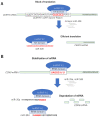Tumor-Progressive Mechanisms Mediating miRNA-Protein Interaction
- PMID: 34830186
- PMCID: PMC8622902
- DOI: 10.3390/ijms222212303
Tumor-Progressive Mechanisms Mediating miRNA-Protein Interaction
Abstract
MicroRNAs (miRNAs) are single-stranded short-chain RNAs that are endogenously expressed in vertebrates; they are considered the fine-tuners of cellular protein expression that act by modifying mRNA translation. miRNAs control tissue development and differentiation, cell growth, and apoptosis in cancer and non-cancer cells. Aberrant regulation of miRNAs is involved in the pathogenesis of various diseases including cancer. Numerous investigations have shown that the changes in cellular miRNA expression in cancerous tissues and extracellular miRNAs enclosed in exosomes are correlated with cancer prognosis. Therefore, miRNAs can be used as cancer biomarkers and therapeutic targets for cancer in clinical applications. In the previous decade, miRNAs have been shown to regulate cellular functions by directly binding to proteins and mRNAs, thereby controlling cancer progression. This regulatory system implies that cancer-associated miRNAs can be applied as molecular-targeted therapy. This review discusses the roles of miRNA-protein systems in cancer progression and its future applications in cancer treatment.
Keywords: RNA-binding protein; cancer therapy; microRNA.
Conflict of interest statement
The authors declare no conflict of interest.
Figures



References
Publication types
MeSH terms
Substances
Grants and funding
LinkOut - more resources
Full Text Sources
Medical

